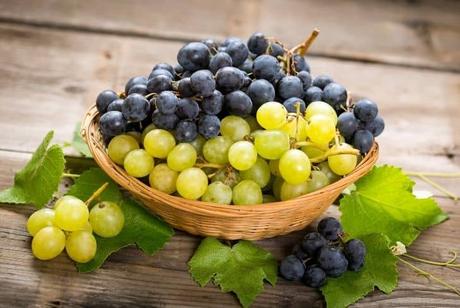Apart from water, there is one other drink that is depicted in contemporary, ancient and medieval movies, books and stories. It goes back a long time it is even present in the Bible. This drink is wine and is made from a variety of sources. Wine is an alcoholic drink that has been consumed for thousands of years and is made from fermented grapes.
This also translates that grapes have been cultivated for thousands of years, being revered by ancient civilizations for their use in winemaking. Grapes come in different colors like red, green, and purple grapes, as well as different forms like seedless grapes, grape jelly, grape jam and grape juice, raisins, currants, and sultanas.

If fermenting grapes results in wine, can composting grapes result in healthy compost for the garden? This article dissects grapes vis-à-vis composting.
Can You Put Grapes in Compost?
Oh yes, grapes are compostable and are perfectly okay inside a composting bin. They decompose incredibly quickly inside the compost and can start to rot on a fruit bowl if you have forgotten about them. Grapes, their skin, pulp and seeds make wonderful compost, introducing nutrients to the final compost.It is reported that some vineyards in the United States compost their winery waste, also known as pomace because it makes a great soil amendment by adding valuable organic nutrients to the soil as well as improving its texture.
Grapes are perfectly fine inside a composting bin, although need to be turned occasionally so that they mix well with the soil.
Winemakers use a lot of grapes to make their wine and after every crush, wineries are left with the skins, pulp, seeds, stems, leaves, and other residues from winemaking after the juice has been pressed and fermented. Many wineries prefer to send the pomace to landfills, but some prefer to compost it.
According to Compost Turner, pomace is made up of about 8% seeds, 10% stems, 25% skins and 57% pulp. The grape pomace is rich in nitrogen, potassium, calcium and phosphates, properties that are required by the soil.
Given its organic and nutrient contents, the value of grape pomace as compost and fertilizer is very high, although it depends on the presence of the proportion of organic matter which will be combined to make compost, favorable to the soil.
Except for rich organic matters, grape and winery waste contributes to environmental pollution. To effectively use these organic wastes and meet sustainability, composting the waste is the best way out. It not only solves the pollution problem but also reuses the matter, which in sense means it is material recycling.
Additionally, composting grapes and their pomace requires less energy and is cost-efficient. When it comes to composting grapes, you can throw them inside the composter, with their stalks, leaves and stems. You can also choose to freeze some grapes if you do not want to compost all of them at the same time. however, be careful that most grapes might contain traces of pesticides.
The pesticide might be over by the time you are consuming the grapes but to be on the safe side, soak the grapes in vinegar and then rinse using clean water before consuming them or even before composting them. The pesticide might survive the compost and be back in the garden, especially if you compost a lot of grapes.
Can You Compost Grape Stems?
Definitely! Grape stems are also compostable, like the fruit itself. Although they are woody, the stems and branches are still relatively green and fresh. These prunings can be composted and be used back in the vineyard or another garden. What you have to carefully look out for is if they were infested or infected with pests and diseases.
If they were not, go ahead and compost them. However, if they were, be very careful about adding them to compost as the disease may lie around and reinfest your garden and crops. When it comes to composting grape stems, they ought to be cut into small pieces.
This facilitates a quick decomposition and also ensures they decompose fully. It also makes it easy to turn the compost as big stalks will be troublesome when it comes to turning the pile or compost bin. At the end of it all, grape stems are a good source of nutrients and returning these nutrients to the soil will be achieved through the process of composting.
According to a study from the University of Idaho, adding vines stems or prunings to dairy manures increases the carbon to nitrogen ratio of dairy manures. They are rich in carbon, can help reduce ammonia emissions, aid in the retention of nitrogen in the compost, and helps with the dilution of application limiting components such as phosphorous, potassium and salts.
All that can allow higher application rates of compost. Composting the stems is the preferable option, instead of burning them which contributes to carbon emissions in the atmosphere.
According to eVineyard, composed prunings can later be used as fertilizer in the same vineyards, and also, adding the woody wastes from the grape industry to the livestock manures improves the quality of the livestock manure itself.
Can You Compost Grapevines?
Certainly, you can compost grapevines. The majority of people tend to mulch the vines, but composting them is also beneficial and reduces the disadvantages posed by mulching. Composting grape vines ensure you get the very best from the vines, whether they were dead or green at the time of addition to the compost.However, be sure not to add acidic compost to grapevines. This is because the acidic properties can burn the vines, and should therefore be placed elsewhere. The other alternative is to add hydrated white lime to your compost to regulate the acidity. Another thing to check out for when composting vines, is to ensure you do not put in those that were diseased.
The bacteria that caused the disease might live on inside the compost, and affect your garden. If you are composting grapes and their vines so that you add the compost to your existing vineyard, you might also pass on the disease to other grapes, causing more harm. Be sure to chop the vines into smaller pieces before placing them into the compost.
Can You Compost Grape Leaves?
Indeed, grape leaves are perfectly compostable. Leaves are a great addition to compost and getting the leaves into your heap will create a much darker, richer soil. They should be scooped up from the floor as soon as they fall. Leaves ensure you get the right balance of compostable as they are classed as a "brown" organic matter.You, therefore, need to add in a mixture of other "browns" as well as some "greens" to get the right consistency. The best leaves for composting are those lower in lignin and higher in calcium and nitrogen. Grape leaves are high in calcium, low in lignin and are slightly below normal on nitrogen. This makes them the perfect addition to the compost.
To achieve the best from grape leaves, they should be broken down into smaller pieces by using a strimmer, lawnmower, chaff cutter or any other tool that can help chop the grape leaves into smaller pieces. Doing this ensures they break down quickly, and they break down in their entirety.
However, avoid diseased leaves as they will just infect your compost and eventually your garden, including your vineyard. Also avoid leaves that might contain traces of herbicides and pesticides, sprayed on them to control pests and other diseases.
These products continue living on your leaves and will end up inside the compost. They might kill the good bacteria and microorganisms, slow down the process and also be transferred through the compost to your other plants.
If you are intent on adding the leaves containing pathogens, consider adding them in the middle of the pile where the reaction is extensive and the heat is high enough to kill them. The location is also ideal as it ensures the leaves decompose quite quickly.
How Long Does It Take For Grapes to Compost?
Composting grapes can take quite a short time in comparison to composting other products. You can tell when your compost is ready when it is hard to distinguish individual waste ingredients. The mix will probably look a lot like dirt and smell "sweet and earthy."
However, depending on your mix of materials and the weather, you can expect to see fresh compost in anywhere from 3 to 6 months. This means that grapes can take about 3 months to about 6 months before they fully decompose. Where the conditions are right, all the correct steps are taken and not too many other materials are added, the composting process can be done in a few months.
Can You Compost Rotten Grapes?
Of course, you can compost rotten grapes. The basic definition of 'rot' is to undergo decomposition. The ultimate goal of composting is for the material to decompose, or in other words to rot. Rotten foods and fruits are therefore halfway towards the ultimate goal of full decomposition and are therefore safe to compost.With that said, it is very important to understand the reason for the rotting. A grape, like other fruits and vegetables, may rot because of changes in enzymes, changes in chemicals, microbiological activity or microbiological activity. The majority of causes of rot are harmless in a compost pile, although there are a few that may spread disease or encourage pests.
If the grape was ripening, the enzymes will continue to ripen it and it could mean the rot was because the fruit was overripe, meaning there was a change in enzymes. This one is safe to compost.
Secondly, the chemicals are responsible for changes in flavor, and browning that is not related to being overripe, mostly due to oxidation or oxygen interacting with a chemical in the plant material. This one is also harmless inside the compost.
As regards microbiological activity, microbes start breaking down fruits and vegetables once chemical and enzymatic changes have weakened them. The majority are harmless, but be very careful of botulism. Botulism is caused by the bacterium Clostridium botulinum and could be present in your jars, where you store the grapes.
If there are signs of botulism in any jar that contains grapes, or if it was the reason for the rotting, do not compost these contents and throw away the entire container.
Microbiological activity is where the rotting is caused by damage done by pests like insects and rodents. Most damage is not dangerous, but if you harvested the grapes, showing signs of extensive damage by aggressive pests, do not compost them.
Many damaging insects can survive in infected plant material and become active again when you use your compost. If that is the case, burn or destroy these plants to avoid an infestation in the future.
Finally, if your grapes are rotting due to rodent activity, throw them away. If you put these items in a compost pile, the rodents will follow the grapes and burrow them into your pile. It is advisable to take care of the rodent problem first, and then you can focus on building a new active compost pile.
References: https://www.medicalnewstoday.com/articles/271156 https://www.compostthis.co.uk/grapes http://www.extension.uidaho.edu/nutrient/Conference/NMC_2014_pdf/Composting%20of%20Dairy%20Manure%20and%20Grape%20Vine%20Pruinings%20Using%20Three%20Differnet%20Composting%20Techniques.pdf

